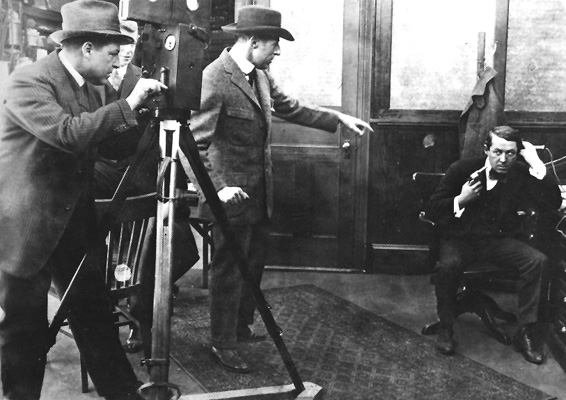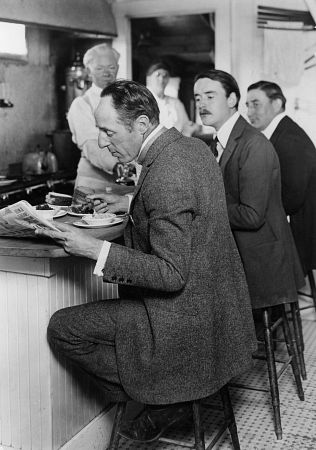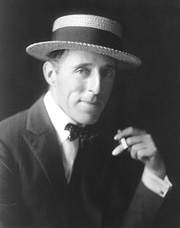
D.
W. Griffith was a product of the stage, an actor and a failed
playwright. But he was also a product of the Biograph years, where he
honed his craft as a filmmaker in short self-contained stories, which
often have an anecdotal quality. In his feature work Griffith frequently used stageplays written by others as source material — he never mastered this formal discipline in stories
he wrote by himself . . . but this is a crucial failing only if you think
movies need to be tightly-plotted narratives with an overall structure
which the individual scenes all serve and to which they are subordinated.
This
ideal became the Hollywood norm, but Griffith was at his best when he
didn't follow and didn't need to follow it — which is why his later
films, when he was trying to fit in to the standardized studio style,
are so inferior to his earlier work.
The
Birth Of A Nation is a rambling, disjointed film narratively — more
like a collection of tales than a unified story in its own right — and is least satisfying when it narrows its focus in its final episodes
to the melodramatic mechanics of its theatrical source. Only the pure
cinematic beauty and power of the Clan ride redeems it from this
reductive derailment of its epic expansiveness.

Intolerance
of course takes this narrative expansiveness to wild extremes, but even
Griffith's great small films, like Broken Blossoms and True Heart
Susie, have an anecdotal quality. There may be a heart-stopping final
action climax or melodramatic denouement, but the films as a whole
don't build towards it with the kind of precision and economy and
momentum we have come to expect from popular movies since the onset of
the studio era.
This
is a criticism one could also level at Huckleberry Finn, which lies
somewhere between the delightful, rambling yarn-spinning of Life On
the Mississippi and the tauter formula fiction of Tom Sawyer. It is
a criticism one could level at The Odyssey, too — and the Bible. All
of these works use narrative formulas, with a more or less developed
overall structure, but proceed episodically, like a series of related
tales told by the fire over the course of many evenings.
One
can see why the studios resisted this sort of storytelling in movies.
It's too hard to predict in advance how movies made this way are going
to turn out — they depend too much on the instincts and the genius of
the storyteller and they lend themselves too much to improvisation.
Griffith's style of anecdotal epic was still fresh in the mind when one
of his truest disciples, Eric Von Stroheim, tried to emulate it in
darker tones in Greed. From his perspective, the experiment of Greed probably didn't look that outrageous — Griffith's method had,
after all, led to astonishing success both critically and commercially. Greed was longer and grimmer, but followed the same loose-knit narrative
strategy.
Thalberg,
a corporate functionary with taste, but a corporate functionary first
and last, really had to destroy the film — not just as a warning to
profligate directors but as a signal that the days of Griffith's method
were over. Enter Rupert Julian and the era of the sensibly-made,
pre-visualizable film. That era produced its own kind of treasures, but
I think one of the reasons we are attracted to the silent era is
because it was the last time the ancient voice of the storyteller could
be heard it all its eccentric, iconoclastic, unclassifiable glory.

Its
echoes took a long time to die out. It was last heard clearly, I think,
in The Godfather, Part II, with its parallel storylines that
reflected each other elliptically and suggestively rather than
according to some formal narrative dialectic. It's a messy film, on one
level, but unified by the passion and conviction of the storyteller's
voice — and the same is true of Griffith's messy masterpieces.
